Canine pneumonia, a condition characterized by lung inflammation and potentially life-threatening complications, demands a vigilant approach from pet owners.
From recognizing early warning signs to navigating treatment options tailored to the underlying cause, understanding the intricacies of this respiratory ailment is paramount.
As we explore the multifaceted nature of pneumonia in dogs, it becomes evident that informed decision-making and proactive care are pivotal in safeguarding our furry companions' health.
The journey of combating this condition delves into a realm where knowledge translates into life-saving actions, underscoring the critical nature of early intervention and comprehensive management strategies.
Key Takeaways
- Pneumonia in dogs can result from various factors like bacteria, viruses, and aspiration.
- Recognize symptoms like coughing, breathing issues, and nasal discharge for prompt intervention.
- Prevent pneumonia by maintaining good health, vaccinations, and isolating sick dogs.
- Immediate veterinary care with appropriate treatment is crucial to manage and treat canine pneumonia effectively.
Understanding Canine Pneumonia
Pneumonia in dogs is a respiratory condition characterized by inflammation in the lungs and fluid accumulation in the air sacs, leading to breathing difficulties and other clinical signs. This condition can be caused by various factors, including bacterial, viral, fungal, or aspiration issues. Common culprits include Bordetella bacteria, distemper, and influenza viruses.
Clinical signs of pneumonia in dogs often include coughing, breathing difficulties, nasal discharge, appetite loss, weight loss, decreased energy levels, fever, exercise intolerance, and lip blowing. Preventative measures such as maintaining good health, updated vaccinations, and isolation of sick dogs are crucial.
Timely veterinary care is essential for appropriate diagnosis and treatment to prevent fatal outcomes associated with pneumonia in dogs.
Causes of Pneumonia in Dogs
Understanding the factors responsible for respiratory distress in dogs sheds light on the various causative agents behind this condition, including bacterial, viral, fungal, and aspiration-related elements. Bacterial pneumonia in dogs can be triggered by pathogens like Bordetella bronchiseptica, Streptococcus, and Escherichia coli.
Viral causes include canine distemper virus, canine influenza virus, and parainfluenza virus. Fungal pneumonia may arise from exposure to organisms like Aspergillus.
Aspiration pneumonia occurs when dogs inhale foreign material or vomit into their lungs, leading to inflammation. Identifying the specific cause is vital for appropriate treatment and management of pneumonia in dogs, highlighting the importance of prompt veterinary intervention and targeted therapies tailored to the underlying etiology.
Signs and Symptoms to Watch For
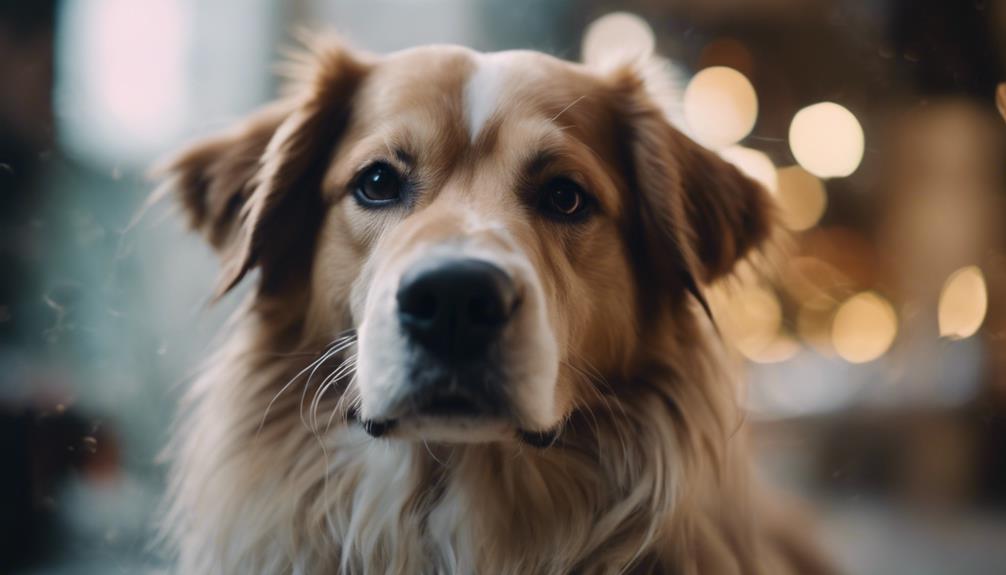
Recognition of the signs and symptoms indicative of respiratory distress in dogs is essential for timely intervention and effective management of their health. When observing your furry companion, watch out for the following signs and symptoms:
- Coughing: Persistent or severe coughing, especially if it produces mucus or blood.
- Breathing Difficulties: Labored breathing, shortness of breath, or rapid breathing.
- Nasal Discharge: Any abnormal discharge from the nose, such as pus or blood.
- General Signs: Loss of appetite, weight loss, decreased energy levels, fever, exercise intolerance, and lip blowing.
If you notice any of these symptoms, seek veterinary care promptly to address potential pneumonia.
Contagion and Prevention Measures
To safeguard the health of both dogs and other pets in a household, it is crucial to implement proper contagion control and preventive measures against respiratory infections. Pneumonia-causing agents have the potential to spread among dogs and cats, emphasizing the need for preventive strategies.
While human transmission from dogs is rare, isolating sick dogs from other pets is advisable to prevent contagion. Maintaining good health practices and ensuring pets have updated vaccinations can help prevent pneumonia outbreaks.
Timely veterinary care plays a significant role in curbing the spread of respiratory infections. By prioritizing these preventive measures, pet owners can minimize the risk of pneumonia transmission and promote the overall well-being of their furry companions.
Importance of Immediate Veterinary Care
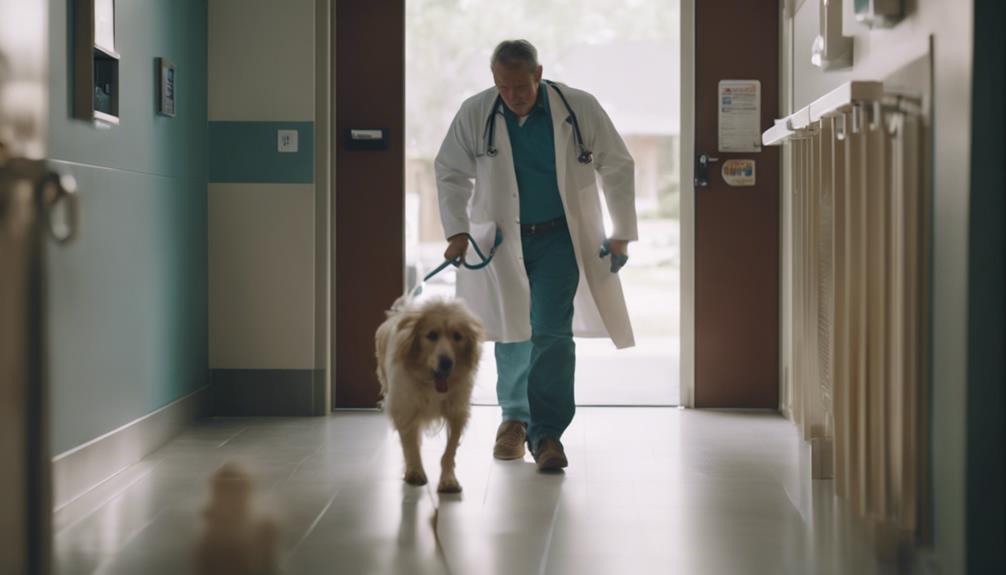
Immediate veterinary intervention is crucial in mitigating the severity and progression of pneumonia in dogs. When dealing with a potential case of canine pneumonia, timely veterinary care plays a pivotal role in ensuring the best possible outcome for the furry patient. Here are four key reasons why immediate veterinary attention is imperative:
- Early Diagnosis: Prompt veterinary care allows for early diagnosis of pneumonia, enabling timely treatment initiation.
- Tailored Treatment: Veterinarians can provide tailored treatment plans specific to the type and severity of pneumonia the dog is experiencing.
- Prevention of Complications: Timely intervention helps prevent the development of severe complications associated with pneumonia.
- Improved Prognosis: Dogs that receive immediate veterinary care have a significantly better prognosis compared to those with delayed treatment.
Tailored Treatment Approaches
Tailoring treatment approaches for canine pneumonia involves customizing therapeutic interventions based on the specific type and severity of the condition. Individualized care is essential to address the diverse causes of pneumonia, which may include bacterial, viral, fungal, or aspiration factors.
Treatment plans may encompass a combination of antibiotics for bacterial infections, antivirals for viral cases, cough medicine, bronchodilators, and anti-inflammatory drugs. The severity of the symptoms, the overall health of the dog, and any underlying conditions must be considered when designing a treatment regimen.
Prompt veterinary care is crucial to prevent complications and ensure a successful recovery. By tailoring treatment approaches to each dog's unique situation, veterinarians can optimize outcomes and improve the chances of overcoming canine pneumonia.
Medications and Therapies for Pneumonia
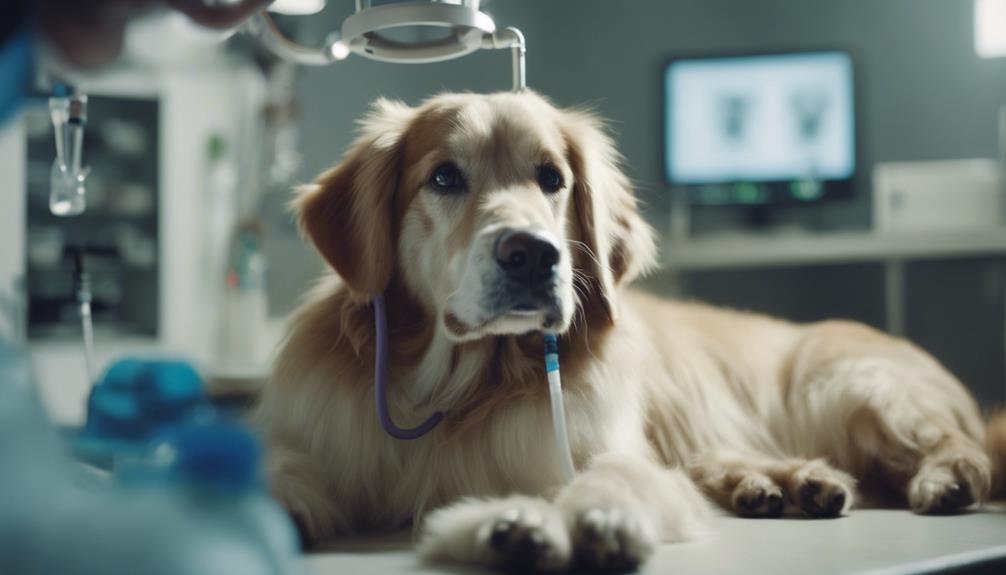
When addressing pneumonia in dogs, the utilization of appropriate medications and therapies plays a pivotal role in managing the condition effectively and promoting a successful recovery.
Medications and Therapies for Pneumonia:
- Antibiotics: Prescribed based on the specific cause of pneumonia.
- Antivirals: Used in cases of viral pneumonia to combat viral infections.
- Cough Medicine and Bronchodilators: Help alleviate coughing and improve breathing.
- Anti-inflammatory Drugs: Aid in reducing inflammation in the lungs to facilitate recovery.
These medications and therapies, when administered under veterinary guidance, can significantly contribute to the dog's healing process and prevent potential complications associated with pneumonia.
The Role of Antibiotics and Antivirals
The administration of appropriate antibiotics and antivirals is crucial in effectively treating pneumonia in dogs by targeting the specific causative factors. Antibiotics are primarily used to combat bacterial pneumonia, with the choice of antibiotic dependent on the identified bacteria and its susceptibility profile. Commonly prescribed antibiotics include amoxicillin-clavulanate, doxycycline, or enrofloxacin.
Antivirals, on the other hand, are essential for treating viral pneumonia caused by viruses like distemper or influenza. These medications work by inhibiting viral replication and spreading within the body. It is imperative to follow the veterinarian's prescription diligently, ensuring the full course of medication is completed to prevent antibiotic resistance and ensure a successful recovery for the dog.
Home Care Guidelines for Dog Owners

To ensure optimal recovery and well-being for dogs diagnosed with pneumonia, diligent home care practices play a pivotal role in supporting their treatment and comfort.
Home Care Guidelines for Dog Owners:
- Maintain a Calm Environment: Provide a warm and cozy space for your dog to rest.
- Hydration and Nutrition: Offer food and water as usual, avoiding over-the-counter medications.
- Preventive Measures: Focus on your dog's overall health and avoid contact with sick animals.
- Vaccination: Ensure your dog's vaccinations are up to date, especially for Bordetella and DHPP to prevent respiratory infections.
Creating a Calm and Supportive Environment
Establishing a serene ambiance is essential in fostering the recovery of dogs diagnosed with pneumonia. A tranquil environment can help reduce stress and anxiety levels, aiding in the healing process. Creating a calm and supportive atmosphere involves providing a warm, quiet space for the dog to rest without disruptions.
Minimizing loud noises and limiting interactions with other pets can promote relaxation and comfort. Soft bedding, gentle lighting, and maintaining a comfortable room temperature are also crucial factors in ensuring the well-being of a dog battling pneumonia. Additionally, offering reassurance and gentle care can go a long way in helping the dog feel secure during this challenging time.
Nutritional Support and Hydration Tips
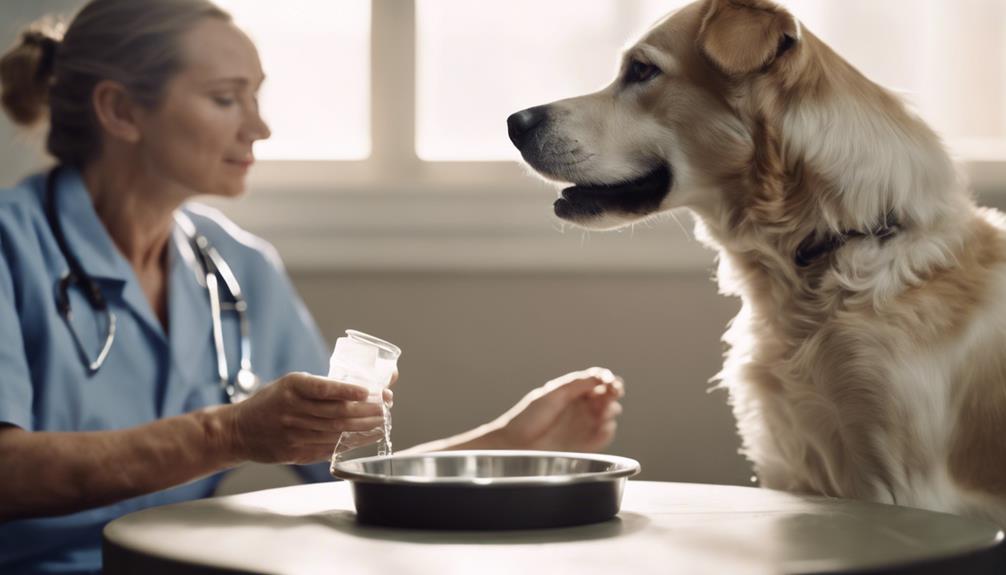
Supporting a dog's recovery from pneumonia involves implementing effective nutritional strategies and ensuring adequate hydration. To aid in the recuperation process, consider the following tips:
- Balanced Diet: Provide a balanced diet rich in essential nutrients to boost the immune system.
- High-Quality Protein: Incorporate high-quality protein sources to aid in tissue repair and recovery.
- Hydration: Ensure your dog has access to fresh water at all times to prevent dehydration.
- Small, Frequent Meals: Offer small, frequent meals to prevent overexertion during eating and aid in digestion.
Vaccination Protocols for Preventative Care
Implementing a structured vaccination protocol is essential for safeguarding dogs against preventable diseases and ensuring their long-term health and well-being. Vaccinations play a crucial role in preventing various infectious diseases that can lead to pneumonia in dogs. Here is a summary of some essential vaccines for preventative care:
| Vaccine | Disease Prevented |
|---|---|
| DHPP | Distemper, Hepatitis, Parvovirus, Parainfluenza |
| Bordetella | Kennel Cough (Bordetella bronchiseptica) |
| Leptospirosis | Leptospira bacteria |
| Rabies | Rabies virus |
| Canine Influenza | Canine Influenza virus |
Ensuring your dog is up to date with these vaccines can significantly reduce the risk of contracting illnesses that may lead to pneumonia.
Prognosis and Recovery Expectations
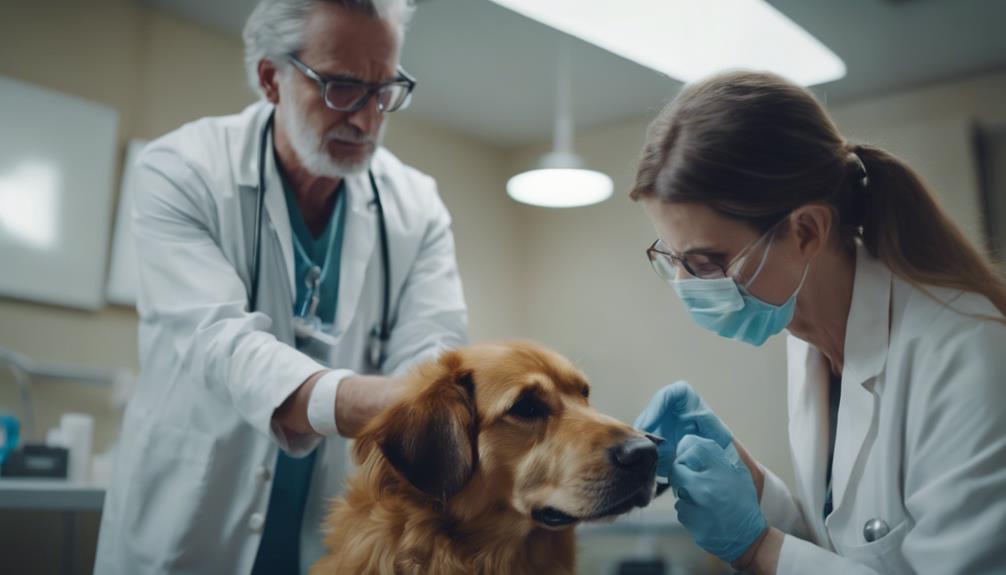
Assessing the potential outcomes and anticipated recovery timeline is crucial when managing pneumonia in dogs. Understanding the prognosis aids in preparing for the necessary care and monitoring. Here are key factors that influence a dog's recovery:
- Underlying Cause: Identifying the specific cause of pneumonia guides treatment efficacy.
- Overall Health: A dog's general health and immune system strength significantly impact recovery.
- Timely Treatment: Swift intervention with appropriate medications enhances the chances of a full recovery.
- Follow-Up Care: Consistent follow-up appointments and adherence to the veterinarian's instructions are vital for monitoring progress and adjusting treatment as needed.
Conclusion
In conclusion, canine pneumonia is a serious condition that requires immediate veterinary attention and proper treatment. Understanding the causes, signs, and preventive measures can help pet owners advocate for their furry companions' well-being.
Creating a calm and supportive environment, providing nutritional support, and adhering to vaccination protocols are essential aspects of managing canine pneumonia.
With timely intervention and proper care, dogs diagnosed with pneumonia have a good prognosis for recovery.




